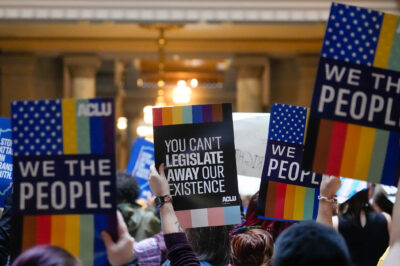
How can you better protect your privacy from Google data collection?
Which legal architect of the torture program advised the Senate not to block the use of NDAA indefinite detention provisions?
In which state did a principal make anti-LGBT remarks to public school students?
This week the ACLU was in court to challenge anti-immigrant laws in which states?
Google’s New Privacy Settings Go Into Effect
This week, Google put in place a new privacy policy across the vast majority of Google products and platforms. As we told you when they announced the new policy back in January, the new policy makes clear that Google will, for the first time, combine the personal data you share with any one of its products or sites across almost all of its products and sites (everything but Google Chrome, Google Books, and Google Wallet) in order to obtain a more comprehensive picture of you. And short of signing out of your Google account, there is no opting out.
Thankfully, our friends at the Electronic Frontier Foundation, the Daily Mail and others have put together a handy guide on how to clear your Web history before the change takes place and how to “pause” collection of your Web history to make all of your data anonymous.
Will Congress Finally Start to Clean Up the Mess It Made With the NDAA?
The Senate Judiciary Committee on Wednesday held the first hearing ever on the indefinite military detention provisions in the 2012 National Defense Authorization Act (NDAA), which Congress passed in December. This hearing was Congress’ first opportunity to own up to its mistakes and start to fix them.
At the hearing, Steven Bradbury, who was the head of the Justice Department’s Office of Legal Counsel during the Bush administration and was one of the top legal architects of the torture program, advised the Senate not to block the use of the NDAA indefinite detention powers in the United States itself.
How Do I Marginalize Thee? One High School Principal Counts the Ways
At an assembly earlier this month, Principal Dorothy Bond of Haywood High School in Brownsville, Tenn. reportedly threatened to expel any gay student who publicly shows affection for members of the same sex. According to students and families who contacted the ACLU, Principal Bond proclaimed that gay students are “not on God’s path” and are “going to a bad place.” No, the “bad place” is not Haywood High. Rather, as Principal Bond made clear to a lesbian student she earlier singled out for displaying affection for her girlfriend, Principal Bond believes that gay students are “going to hell.” Principal Bond also allegedly interfered with efforts to establish a Gay-Straight Alliance at Haywood High and may have prevented students in same-sex relationships from attending the school prom as couples.
So the ACLU sent a letter to the superintendent yesterday afternoon asking the school to clarify students’ rights. Within three hours of the district receiving our letter, Bond resigned. We hope this swift victory sends a message to other schools that discrimination against any student is not an American value.
Alabama Under Siege: The Human Costs of H.B. 56
The ACLU was in court Thursday challenging the constitutionality of both Alabama and Georgia’s discriminatory anti-immigrant laws. Of the five Arizona-inspired laws to pass, only Alabama’s has had significant provisions go into effect. The result: divided communities and devastation to the state’s economy and reputation. Five months have now passed since those parts of Alabama’s law, H.B. 56, went into effect, and Alabama’s immigrant and Latino communities remain in a state of terror. Although tens of thousands fled Alabama in those first few days and weeks, others have committed to staying in their communities, hoping the legal challenges and basic human decency would prevail. People have held out hoping they would not have to uproot their families and leave their homes, notwithstanding the clear message that they were no longer welcome, at least by those in charge of the State government.
This is your week in civil liberties. Let us know if this is useful or if you’d like to see changes. Share your thoughts: ideas@aclu.org
Learn more about your rights: Sign up for breaking news alerts, follow us on Twitter, and like us on Facebook.



